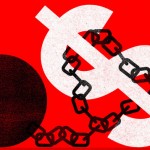Casey Research’s Jeff Thomas on the above new term by the G20 countries used to describe the bank bailin approach in the event of banking crisis – financial repression .. bailin legislation is now put in to most of the indebted world – including the U.S. & Canada .. “The wording of the legislation differs slightly in each country, but the objective is the same. Essentially, what it means is that the banks are pre-authorized by their respective governments to confiscate the savings of depositors, should they (the banks) decide that an ’emergency’ exists. I think it’s safe to say, that, even if an emergency does not exist, one can be trumped up. The temptation to legally steal trillions of dollars from depositors will prove too great.” – some caveats as some countries will have “insured” levels which are protected from confiscation & some countries will have the banks give something back like stocks in the bank which may not have much value in the event of a bank crisis .. Thomas advises moving deposit funds to hard assets like art, jewellery & especially precious metals outside of the banking system in secure storage locations of certain jurisdictions.
Blog
 02/01/2015 - Financial Repression – Bailins: “Adequacy of Loss-Absorbing Capacity of Global Systemically Important Banks in Resolution”
02/01/2015 - Financial Repression – Bailins: “Adequacy of Loss-Absorbing Capacity of Global Systemically Important Banks in Resolution”
 01/31/2015 - Financial Repression in Europe
01/31/2015 - Financial Repression in Europe

Chris Whalen* highlights the desperation to save the euro zone through a program of quantitative easing (QE) .. it’s all about trying to make huge levels of debt go away .. central bankers are now combining QE with low or negative interest rates to transfer wealth from savers to debtors .. it’s all about financial repression .. “In Germany and Switzerland, for example, interest rates on government debt are already negative, meaning that governments are confiscating money from bond investors. Sounds great, yes? But the only problem is that all of these QE programs by the Fed and ECB, and also the Bank of Japan, do not really address the core problems facing the industrial nations—too little growth measured in jobs and consumer income, and too much debt.” .. on the euro zone’s desperation: “The ECB bond purchase program is a desperate effort to stave off the day of economic reckoning in Europe via inflation and currency devaluation.” .. concludes by warning these policies are setting the stage for the next financial crisis.
 01/30/2015 - Financial Repression Without Representation in Europe
01/30/2015 - Financial Repression Without Representation in Europe

“The problem with any QE program is that debtors get bailed out while savers are repressed .. This is the argument that the FED has used as both Bernanke and Yellen have told American savers that they have benefited from QE in many ways: lower mortgages, increased jobs for their friends, relatives and neighbors and overall a healthier and more robust U.S. The fallout from the European Central Bank’s program will not be immediately realized but its potential damage has resulted in Chancellor Merkel being very upset with ECB President Draghi. The FINANCIAL REPRESSION OF GERMANY’S SAVERS WILL PROVIDE ELECTORAL POWER TO THE ALREADY GROWING INFLUENCE OF THE AfD (Alternative for Deutschland) .. Understand the ways in which governments liquidate their accumulated debt caused by wars and social welfare commitments. The power of negative real yields and inflation has the power to destroy the creditors. The use of QE is a move to cap interest rates for debtors and it will not do anything to aid the highly indebted peripheral nations. Combine capped interest rates with higher levels on inflation and you have a sorcerer’s guide to debt repudiation through the alchemy of financial repression.”
– Yra Harris
 01/29/2015 - Financial Repression: The Liquidation of Government Debt New IMF Paper by Reinhart & Sbrancia
01/29/2015 - Financial Repression: The Liquidation of Government Debt New IMF Paper by Reinhart & Sbrancia

New IMF paper by Carmen Reinhart & M. Belen Sbrancia .. presents how public debt is often reduced through the use of financial repression – a tax on bondholders & savers via negative or below market real interest rates .. from abstract:High public debt often produces the drama of default and restructuring. But debt is also reduced through financial repression, a tax on bondholders and savers via negative or below-market real interest rates. After WWII, capital controls and regulatory restrictions created a captive audience for government debt .. Financial repression is most successful in liquidating debt when accompanied by inflation. For the advanced economies, real interest rates were ne gative ½ of the time during 1945–1980. Average annual interest expense savings for a 12—country sample range from about 1 to 5% of GDP for the full 1945–1980 period. We suggest that, once again, financial repression may be part of the toolkit deployed to cope with the most recent surge in public debt in advanced economies.”
 01/28/2015 - Financial Times definition of Financial Repression
01/28/2015 - Financial Times definition of Financial Repression

The Financial Times defines it: “Financial repression is a term used to describe measures sometimes used by governments to boost their coffers and/or reduce debt. These measures include the deliberate attempt to hold down interest rates to below inflation, representing a tax on savers and a transfer of benefits from lenders to borrowers. Financial repression is also used to describe measures to facilitate a domestic market for government debt and the imposition of capital controls. The combined effect of all these measures means funds are channeled to the government that would otherwise flow elsewhere.”
 01/28/2015 - EXPECT NEGATIVE RATES FROM THE FED TO STOP US DOLLAR RISE
01/28/2015 - EXPECT NEGATIVE RATES FROM THE FED TO STOP US DOLLAR RISE

Patrick Barron predicts (via Mises Canada)…
I predict that the Fed will start charging negative interest rates on bank reserve accounts, which will ripple through the markets and result in negative interest rates on savings at banks.
I make this prediction only because it is the logical action of the Keynesian managers of our economy and monetary policy.
Our exporters will scream that they can’t sell goods overseas, due to the stronger dollar.
So, what is the Fed’s option? Follow the lead of Switzerland and Denmark and impose negative interest rates in order to drive down the foreign exchange rate of the dollar.
It is the final tool in the war on savings and wealth in order to spur the Keynesian goal of increasing “aggregate demand”.
If savers won’t spend their money, the government will take it from them
 01/24/2015 - Financial Repression is Financial Authoritarianism
01/24/2015 - Financial Repression is Financial Authoritarianism

“When I first heard of financial repression, it was from some IMF document, and I immediately thought it was a mistake. Why would they use a term that conveys authoritarianism or something negative when they really wanted to use some sort of boring academic phrase? It’s actually ironic they chose that term .. I think what the IMF calls financial repression is better described as financial authoritarianism. Because we’re not just talking about repressing financial things, like artificially low interest rates to help a government finance its debt, which sounds pretty academic or abstract to most people. But when you look at the indirect and the immeasurable effects that come from financial repression, it negatively affects all aspects of life. That’s why I believe it is more accurate to call it financial authoritarianism, because that’s what it basically is. Central banking and a fiat money are the main enablers of financial repression. It gives the government the tools to manipulate the currency, to manipulate the interest rate that they otherwise wouldn’t have under a sound-money kind of system. Financial repression is needed to help governments finance debt .. Dealing with an out of control government debt burden which comes from out of control government spending, is where the impetus for financial repression comes from.”
LINK HERE TO THE RELATED ARTICLE
 01/23/2015 - “Macroprudential Tools” Entail Financial Repression
01/23/2015 - “Macroprudential Tools” Entail Financial Repression

INET Economics posted essay on new research shedding light on how today’s advanced economies depend on private sector credit more than anything we have ever seen before .. the research work indicates that our economic future could be very different from our recent past, when financial crises were relatively rare .. “Crises could become more commonplace, which will impact every stage of our financial lives, from cradle to retirement. Do we just fasten our seatbelts for a bumpy ride, or is there a way to smoothe the path ahead?” .. more financial instability will introduce more uncertainty down the line .. “Operating in this milieu, the central banks, the governments, the Bank for International Settlements (BIS), the International Monetary Fund (IMF), and other parts of the macro-financial policy world are now taking a much keener interest in what the pros and cons of different financial regulatory structures and various macroprudential tools (designed to identify and lessen the risks to the financial system) might be.” – [Macroprudential tools entail financial repression – inflation, negative interest rates, ring fencing regulations & obfuscation.]
 01/22/2015 - The Financial Markets Have Been Replaced By Financial Repression
01/22/2015 - The Financial Markets Have Been Replaced By Financial Repression

“As investors we are all now the subjects of a grotesque monetary experiment. This experiment has never been tried before, and its outcome remains uncertain. The unproven thesis, however, runs something like this: six years into a second Great Depression, the only ‘solution’ is for central banks to print ever greater amounts of money. Somehow, gifting free money to the banks that helped precipitate the crisis will lead to a ‘trickle down’ wealth effect. Instead of impoverishing those with savings, inflation will be some kind of miraculous curative, and it must be encouraged at all costs. It bears repeating: we are in an extraordinary financial environment. In the words of the fund managers at Incrementum AG: ‘We are currently on a journey to the outer reaches of the monetary universe.’ .. The market – a quaint concept of a bygone age – has largely disappeared. It has been replaced throughout the West by bureaucratic manipulation of prices, in part known as QE but better described as financial repression.”
– Tim Price
 01/21/2015 - Will the Federal Reserve Create Inflation by Stopping Its Interest Payments on Bank Excess Reserves?
01/21/2015 - Will the Federal Reserve Create Inflation by Stopping Its Interest Payments on Bank Excess Reserves?

The Daily Bell essay points out how central banks would rather create inflation than live with a “gentle deflation” that free marketeer Murray Rothbard advocated .. after all, inflation helps governments reduce their debt burdens through financial repression .. right now banks are being paid 0.25% interest on their bank excess reserves held at the Federal Reserve, but if the Federal Reserve reduces this interest rate, it could push banks to begin lending or somehow putting this money into the real economy, ultimately generating inflationary forces – in addition to debasing currency by printing more of it, this is another way inflation can be generated .. “The banking class for no good reason has decided that inflation is preferable to deflation, probably because they (only they) have access to the printing presses and thus can cause monetary inflation. There is no reason to fear gentle deflation, but it has been made into a bogeyman. This gives bankers the justification to print. And print they must. In 2015, we’ll see a lot more of it, especially given all the alarmist warnings in the mainstream media about the danger of currency that increases in value. Conclusion: Only debasement will do.”
 01/20/2015 - Charles Biderman Talks Financial Repression
01/20/2015 - Charles Biderman Talks Financial Repression

Special Guest: Charles Biderman – Founder & CEO, Trim Tabs Investment Research Inc.
A seasoned professional, Charles Biderman points out that when you create money, you create debt. When that debt goes to front run demand you will face the problems we are now facing in the energy industry with supply or ghost cities in China. Zero interest rates has brought forward demand which is now resulting in commodity deflation. “There is now no relationship between the economy and the stock market because of zero interest rate policies!”.
FINANCIAL REPRESSION
“The markets are rigged by the central bank policy of zero interest rates. To the extent the markets are rigged we don’t have free markets. That would be Financial Repression!”
A ‘NO GROWTH’ WORLD
“We are in a no growth world. We have governments in the US, Europe,Japan and China that are anti-growth, anti-free market growth. On the other hand we have central banks that are committed to creating as much money as is necessary to keep stock markets as high as they can be even though we have a total disconnect between the  economy and the markets. The only reason the markets are doing as well as they are doing (both equity and bonds) is because of zero interest rates. In essence free money from the central banks!”
economy and the markets. The only reason the markets are doing as well as they are doing (both equity and bonds) is because of zero interest rates. In essence free money from the central banks!”
“The zero interest rate policy of the global central banks is creating a global recession, not a global recovery!”
“The central banks have no clue what they are doing .. at some point the people will realize the emperor has no clothes and the US debt is not worth the paper it is written on!”
“Remember, this whole free money binge was to be a bridge over the downturn so the economy would recover. But when you have no-growth, anti-growth policies in place prohibiting real economic growth you are going to have no growth and higher prices.”
NO-GROWTH, ANTI-GROWTH POLICIES
The US needs to grow at close to 10% a year to fund the current debt and entitlement obligations. Charles feels it is obvious that his is not going to happen. “The US is bankrupt! …. like Vallejo, CA we will be forced to restructure!”
 01/20/2015 - Dr. Lacy Hunt Talks Debt Deflation
01/20/2015 - Dr. Lacy Hunt Talks Debt Deflation

Special Guest: Dr. Lacy Hunt – Executive Vice President Hoisington Investment Management Company
Lacy Hunt and his partner Van Hoisington were called “The Henry Fords of bond investing” by Forbes Magazine. You can understand why when you listen to Dr Lacy Hunt describe the current global macro environment.
FINANCIAL REPRESSION
“A superficial attempt to deal with the excessive indebtedness that grips the global economy .. and in my opinion will not work!”
“Monetary Policy is not the solution here. There are Fiscal Policy solutions but they require shared sacrifice, strong leadership (something we don’t have in the US or Europe – no one has) … basically what w are trying to do is to solve an extremely over-indebted situation domestically and globally by taking on more debt and aggravating the problem “
DEFLATION
“The current economic maladies and continuing downshift of economic activity has been the over-accumulation of debt. In many cases
“Debt funded the purchase of consumable and non-productive assets, which failed to create a future stream of revenue to repay the debt.”
“The increase since 2008 has been primarily in emerging economies. Since Debt is the acceleration of current spending in lieu of future spending.”
CURRENCY MANIPULATION
- Impairs global activity,
- Spurs dis-inflationary or deflationary trends and
- Engenders instability in world financial markets.
INTEREST RATES
“The downward pressure on global economic growth rates will remain in place in 2015. Therefore record low inflation and interest rates will continue to be made around the world in the new year, as governments utilize policies to spur growth at the expense of other regions.”
“new lows in yields in 2015 in the intermediate- and long-term maturities of U.S. Treasury securities”
THE CURRENCY WARS OF THE 1920’S & 1930’S
Lacy muses on the effects of debt and takes us back to the ’20s and ’30s, when there were similar problems with debt in countries that had engaged in currency wars for over a decade.
Clearly the policies of yesteryear and the present are forms of “beggar-my-neighbor” policies, which theMIT Dictionary of Modern Economics explains as follows: “Economic measures taken by one country to improve its domestic economic conditions … have adverse effects on other economies. A country may increase domestic employment by increasing exports or reducing imports by … devaluing its currency or applying tariffs, quotas, or export subsidies. The benefit which it attains is at the expense of some other country which experiences lower exports or increased imports.… Such a country may then be forced to retaliate by a similar type of measure.”
The existence of over-indebtedness, and its resulting restraint on growth and inflation, has forced governments today, as in the past, to attempt to escape these poor economic conditions by spurring their exports or taking market share from other economies. As shown above, it is a fruitless exercise with harmful side effects.
It behooves us to pay attention to Lacy since he has been one of the most accurate forecasters of interest rates for the last 20 to 30 years.
2015 -Parallels to that earlier period.
- First, there is a global problem with debt and slow growth, and no country is immune.
- Second, the economic problems now, like then, are more serious and are more apparent outside the United States. However, due to negative income and price effects on our trade balance, foreign problems are transmitting into the U.S. and interacting with underlying structural problems.
- Third, over- indebtedness is rampant today as it was in the 1920s and 1930s.
- Fourth, competitive currency devaluations are taking place today as they did in the earlier period. These are a combination of monetary and/or fiscal policy actions and also, with floating exchange rates, a consequence of shifting assessments of private participants in the markets.
 01/19/2015 - Professor Steve Keen Talks Financial Repression
01/19/2015 - Professor Steve Keen Talks Financial Repression

Special Guest: Professor Steve Keen – Professor & Head Economics, History & Politics Kingston University, London
THE ART OF GETTING AN EDUCATION IN ECONOMICS
Professor Steve Keen has found that top flight universities are dominated by very narrow, doctrinaire teaching. This stylized view has resulted in critics of this view only getting jobs in low ranking university. With pride Steve Keen puts his latest university in that camp. “If you want a good education in Economics, you don’t go to a good university. The wider range of thought and diverse analytics is found at the lower ranking university. Kingston University is one of those classic university!”
FINANCIAL REPRESSION
He does not consider himself an Austrian Economist though he sees it has a number of key tenets that 85% of the economist aren’t aware.
He sees Financial Repression as more about the size of the debt burden within an economy which drives the behavior of central banks. It is about the excess weight of private debt crushing the economy. Everything else is a result of this.”
The results include the “badly thought out Quantitative Easing response to a crisis which they caused by effectively ignoring the growth in private sector debt, but aren’t even aware that this is the cause of the crisis.” “Very few banks have any real clue of what they are doing. If you doubt this, all you have to do is read the minutes of the Federal Reserve. They wouldn’t dare make them up because it makes them look like a bunch of fools who have no idea what is happening.”
Obviously this sort of view does not make Professor Keen popular with the establishment, seeking prestigious and lucrative government and teaching positions.
QE IS NOT MONEY PRINTING!
Irving Fishers explanation of where the Great Depression evolved from was the level and growth of private debt along with too low a rate of inflation. Prof Keen is of this school in which reducing this debt will only result in further falling economic growth. Former Fed Chairman and expert on the Great Depression did not believe this. Professor Keen considers Bernanke’s argument against this a “load of waffle!”. “It is completely naive to the role of banks in the economy!”
Professor lays out why he was able to warn of the coming 2008 Financial Crisis an why he does not feel the current “revival’ can last anymore than 5 years before the same sort of thing occurs.
MODERN DEBT JUBILEE
This interview is worth listening to simply for Professor Keens concept of Modern Debt Jubilee and the Syrian history of successfully doing this every 49 years. You may not agree with his view but it an interesting history lesson of how this worked prior to the advent of central banking.
Many may also agree with his views and the discussion on why the Euro was always a mistake as will be Draghi’s expected upcoming QE announcment. Few will likely also disagree with Professor Keen that moden central banking do not properly understand the role of banks, money, debt and capitalism.
Steve’s closing advise: “Don’t trust the economists!!”
 01/18/2015 - GMO’s James Montier: Capital Preservation in the Age of Financial Repression
01/18/2015 - GMO’s James Montier: Capital Preservation in the Age of Financial Repression

A couple years old but still relevant .. Montier explains the challenges of investing & preserving capital & purchasing power in our current environment of financial repression .. defines financial repression as: “Financial repression can be defined (somewhat loosely, admittedly) as a policy that results in consistent negative real interest rates. Keynes poetically called this the ‘euthanasia of the rentier.’ .. The tools available to engineer this outcome are many and varied, ranging from explicit (or implicit) caps on interest rates to directed lending to the government by captive domestic audiences (think the postal saving system in Japan over the last two decades) to capital controls (favoured by emerging markets in days gone by).” .. sees a battle between Scylla and Charybdis when investing in financial repression, facing either the likely but limited erosion of purchasing power from holding cash, or the uncertain but potentially disastrous loss of capital that arises from owning overvalued stocks .. “There are no easy answers to the problem of capital preservation in an age of financial repression, only difficult choices.” .. link to www.gmo.comto register for free & get the PDF or
 01/17/2015 - Principal Global Investors’ & CREATE Research Report on Investing in Financial Repression
01/17/2015 - Principal Global Investors’ & CREATE Research Report on Investing in Financial Repression

Principal Global Investors’ CEO Jim McCaughan writes the Foreword in this research report by CREATE Research on investing in a debt-fueled world, within a key theme of financial repression .. report: “Investors are also worried about the revival of a long-forgotten phenomenon: financial repression. This is caused when central banks keep the rates artificially low for a long period of time in an effort to help governments finance their debts. It is feared that a combination of low rates and rising inflation will steadily vaporize public debt and erode the purchasing power of the underpinning assets.” .. the report looks at investing in this environment from a retail investor & a pension fund investor perspective .. from last year but still relevant.
 01/16/2015 - Martin Armstrong Talks Financial Repression
01/16/2015 - Martin Armstrong Talks Financial Repression

Special Guest: Martin Armstrong – Editor & Publisher of Armstrong Economics
FINANCIAL REPRESSION
“What it really is, is a power struggle where we go through cycles where people have confidence in the people, then government. It oscillates back and forth and now we are in a phase we can call the ‘Private Sector Phase’, where people are questioning government.”
“Repression comes in when it is about whatever it takes to maintain power! Largely it is about the fact they are going broke because they have promised all sorts of pensions, and these sorts of things, but they have not funded them!”
GOVERNMENT COMPETENCE
“There is no conspiracy .. it is much worse .. it is really the ‘Keystone Cops’! … government creates the illusion it is in control, but it isn’t in control!”
“People give government and politicians way too much credit. They assume they actually know what they are doing! … what people don’t understand about governments is that we have academics advising and primarily lawyers running the government, with few with any experience or understanding of economics. We should hire traders who at least have some experience!”
“They just don’t understand. There is no design. Everything has been very ‘ad hoc. Its really about the spoils…. giving it to family and friends!”
“If you look at the debt since 1950, you will see that 70% of the national debt is accumulated interest. It didn’t go to provide schools and roads and things of this nature. The whole socialist idea is complete nonsense!”
‘NO PEG HAS EVER LASTED’
The EU, EURO and the recent removal of the Swiss Franc Euro peg are examples of the fundamental problems with government. Martin has consulted to various EU and Swiss authorities since 1998. He is miffed at what he has witnessed but it is no different than has sees everywhere else.
WE ARE IN A DEBT BUBBLE
“We are not facing a stock market crash, we are facing a bond market crash! That is far worse”
“What people don’t realize is that the US Great Depression was a sovereign debt crisis. All of Europe defaulted and went into a moratorium, South America defaulted for about the fourth time and China defaulted. You halt capital formation and that is what a bond crash does. In the great Depression everyone lost. That is what we are facing!”
“We are in a period where on a global scale, capital doesn’t know where to go and the culprit is government. We are in period where there is going to be more confidence to buy bonds such as General Motors than that of any government! There is a substantial difference between Private and Public Debt”
RISING TAXES ARE DEFLATIONARY
Martin believes there is an extremely serious tax problem, especially at the municipal level due to unfunded pensions and obligations. Because wages are not rising in the USA, this is now acting in a deflationary fashion.
 01/15/2015 - FINANCIAL REPRESSION IS ACCELERATING TO FIGHT THE POTENTIALLY DEFLATIONARY WINTER
01/15/2015 - FINANCIAL REPRESSION IS ACCELERATING TO FIGHT THE POTENTIALLY DEFLATIONARY WINTER

NOTE: FIAT MISINFORMATION IS OBFUSCATING REAL SHRINKING GROWTH THAT IS PART OF THE KONDRATIEFF WINTER
IS THE KONDRATIEFF WINTER UPON US?
 01/11/2015 - European Bank Runs Could Come To America
01/11/2015 - European Bank Runs Could Come To America

Interview with Boston University Economics Professor Laurence Kotlikoff .. Kotlikoff says Greece is in financial trouble & that could set off another global financial calamity: “So, you have the same problem. You have a country that is fiscally unsustainable, and they haven’t really been able to get out from under that situation .. It sets up a situation where you could have runs on other banks like in Italy, Spain, Portugal, and that could spread to other banks in other countries, including France and Germany. Remember, the big to do about the Cypriot banks that failed and said they weren’t going to pay off the depositors? That led to a major international panic. It was a small country with two relatively small banks.” .. bank bailins & financial repression .. a daisy chain of defaults and bank runs could happen in Europe: “It could also come to the U.S. If everybody believes the banks are going to be solvent and they can get their money out, that’s fine. But if everybody starts to run on the banks, you want to run before they do because you want to get you money out before it’s all gone.” .. sees the potential for U.S. hyperinflation if there is a loss of confidence in the FDIC deposit insurance system, as depositors take their money out & buy something real .. on the U.S. unfunded liabilities: “Social security is 33% under-financed, according to its own trustees report .. Our entire fiscal enterprise is about 58% under-financed .. the country is really broke.” .. 33 minutes
 01/10/2015 - Robert Wenzel Talks Financial Repression
01/10/2015 - Robert Wenzel Talks Financial Repression

Special Guest: Robert Wenzel – Editor & Publisher of Economic Policy Journal.com & Target Liberty
Long time Austrian School Economist and Libertarian with a professional background in Wall Street Finance, Robert Wenzel warned of the 2007-2008 Financial Crisis in his book: The Fed Flunks: My Speech at the New York Federal Reserve Bank and was subsequently asked to Washington and the Federal Reserve to detail how he knew where “I really gave it to them!!”
FINANCIAL REPRESSION
He sees the central banks of the world and the Federal Reserve as manipulating the economy through interest rates and flows of funds which makes it very difficult for the individual to make money consistently which represses everyone but gives a major advantage to Wall Street. Much of this is done through restrictive regulations where the “devil is in the details”. Very few really understand the significance of the “details”.
Active in Silicon Valley, Robert Wenzel has seen closeup how the ‘regulatory details’ offer major advantage which give staggering advantage and financial gain to the few, but disadvantage or competitively impede many in their business enterprise. Though Robert Wenzel does not use the term he describes the workings of Crony Capitalism which Macro Analytics has chronicled in many previous videos.
“It is a rigged system where they simply write regulations when things go off the rails for them!”
What this means is it is now making it almost impossible for the average person and small business entrepreneur to survive and prosper.
“THE WORST GET TO THE TOP”
When asked how informed politicians are of what is going on, Wenzel is reminded of Nobel Laureate Economist, Fredrich von Hayeks writings in the “Road to Serfdom” that:
“The worse get to the top”
They are willing to say and do anything to get to the top. These are the ones that know what is going on. A lot of elected politicians simply don’t know what is going on and are marginalized. As in the world of finance, “bad money forces out good money”.
“INFLATION & INTEREST RATE SURPRISES AHEAD“
Wenzel believes the Fed’s stated inflation target of 2% is in actuality 3%. Until this level is achieved the Fed is not going to let up. Unfortunately because of the economic lags and distortions in the signals, Wenzel sees it getting out of control resulting in inflation levels not seen since the late 1970’s. Having presented at the Federal Reserve, Wenzel says:
“The Fed is surprisingly unaware of anything outside of money printing! … It is stunning how off the page they are and how they have no clue, as evident in the Fed minutes where they don’t even mention the money supply!”
 01/09/2015 - Dominic Frisby Talks Financial Repression
01/09/2015 - Dominic Frisby Talks Financial Repression

Special Guest: Dominic Frisby
Now 45 years old and having been a comedian since his mid twenties, Dominic Frisby got interested in Economics and Finance in 2005 prior to the Financial Crisis. He subsequently became a devout Gold Bug and follower of Austrian Economics and Sound Money when he decided he needed to manage his money himself.
He concluded that:
“Money should be independent. The role of money is to be a medium of exchange, a store of wealth and a unit of account. But instead Money has become a political tool. The mixing of money and politics is very dangerous!”
Dominic feels strongly that many of our basic daily terminologies such as inflation, capitalism and socialism have become corrupted in their meaning and usage. The same is true for “money”. “All of this has distorted people’s behavior in an almost corrupt way” which he describes as only a comedian can.
FINANCIAL REPRESSION
Dominic Frisby defines Financial Repression as:
“The Government manipulation of money in order to achieve a specific goal. The current goal is to bailout the financial system for the excesses it created in the lead up to the 2008 Financial Crisis and also to bailout themselves.”
“Governments have spend way more than they have earned and now have debt that is unpayable and the way they are paying it back is through manipulation, which other people call Financial Repression.”
WHAT THE FUTURE HOLDS
“This will go on for my life time and my children’s life time …. until something else happens”. Frisby says “don’t shot the messenger but our leaders have gotten away with it so far and history shows leaders have always played tricks with money and debt”. “Financial Repression will always exist as long as we have leaders, just like sinning will always exist – you just have to accept it!”
SOCIAL GOVERNMENT ENTITLEMENTS
The government according to Dominic Frisby, who has spent his life within the UK’s social entitlement program, should have nothing to do with Healthcare, Education and Welfare. “All of this doesn’t need to be as expensive as it is!”
“We need less state, more market and more … ‘people’!”
CONCLUSION
“We need to question everything, including the questioners questions and their dogma”

















